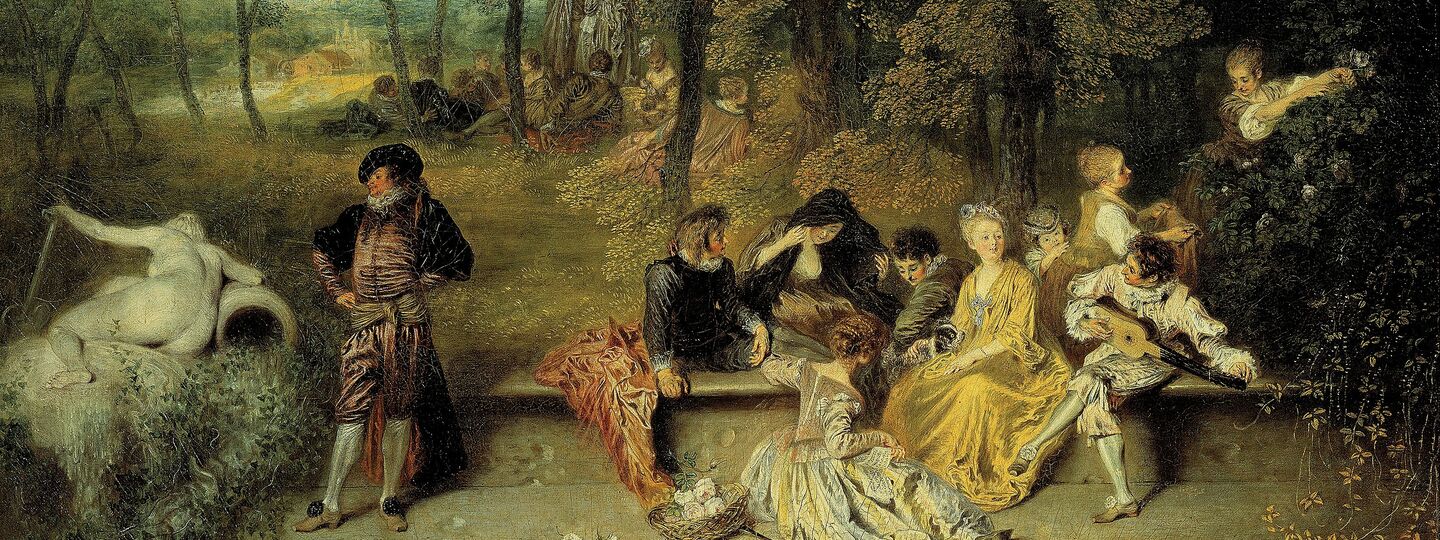
Info
Pleasures of Love
Jean-Antoine Watteau
1718-19
Gemäldegalerie Alte Meister
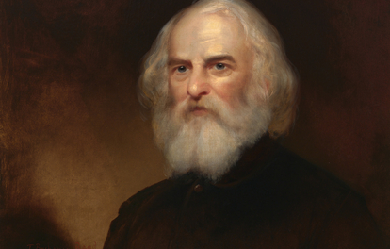
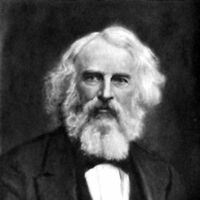
Henry Wadsworth Longfellow (February 27, 1807 – March 24, 1882) was an American poet and educator whose works include "Paul Revere's Ride", The Song of Hiawatha, and Evangeline. He was also the first American to translate Dante Alighieri's The Divine Comedy and was one of the five Fireside Poets. Longfellow was born in Portland, Maine, then part of Massachusetts, and studied at Bowdoin College. After spending time in Europe he became a professor at Bowdoin and, later, at Harvard College. His first major poetry collections were Voices of the Night (1839) and Ballads and Other Poems (1841). Longfellow retired from teaching in 1854 to focus on his writing, living the remainder of his life in Cambridge, Massachusetts, in a former headquarters of George Washington. His first wife, Mary Potter, died in 1835 after a miscarriage. His second wife, Frances Appleton, died in 1861 after sustaining burns from her dress catching fire. After her death, Longfellow had difficulty writing poetry for a time and focused on his translation. He died in 1882.
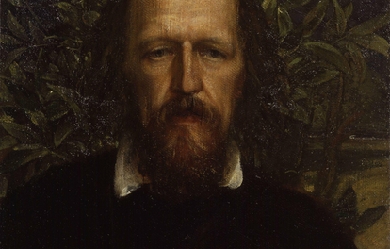
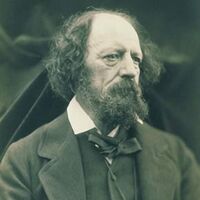
Alfred Tennyson, 1st Baron Tennyson, FRS (6 August 1809 – 6 October 1892) was Poet Laureate of the United Kingdom during much of Queen Victoria's reign and remains one of the most popular poets in the English language. A number of phrases from Tennyson’s work have become commonplaces of the English language, including “Nature, red in tooth and claw”, “'Tis better to have loved and lost / Than never to have loved at all”, “Theirs not to reason why, / Theirs but to do and die”, “My strength is as the strength of ten, / Because my heart is pure”, “Knowledge comes, but Wisdom lingers”, and “The old order changeth, yielding place to new”. He is the ninth most frequently quoted writer in The Oxford Dictionary of Quotations.

Worked in Manufacturing for 45 years. I am now a retired Tool&Die Maker. I am married with two grown children. I write poems, short stories, and some children's stories. I have published Poems in Quarterlies across the US in the 1980's, some awards and honorable mentions. My stories and some poems are now published on Booksie.com --- Author names = D. Thurmond --- & --- JE Falcon.
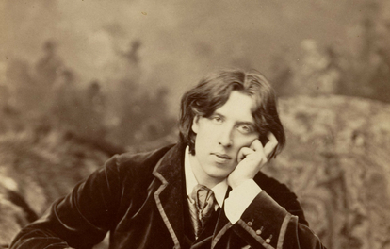
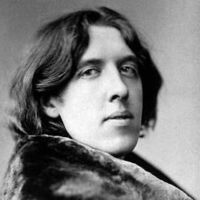
Oscar Fingal O'Flahertie Wills Wilde (16 October 1854 – 30 November 1900) was an Irish writer and poet. After writing in different forms throughout the 1880s, he became one of London's most popular playwrights in the early 1890s. Today he is remembered for his epigrams, plays and the circumstances of his imprisonment, followed by his early death. At the turn of the 1890s, he refined his ideas about the supremacy of art in a series of dialogues and essays, and incorporated themes of decadence, duplicity, and beauty into his only novel, The Picture of Dorian Gray (1890). The opportunity to construct aesthetic details precisely, and combine them with larger social themes, drew Wilde to write drama. He wrote Salome (1891) in French in Paris but it was refused a licence. Unperturbed, Wilde produced four society comedies in the early 1890s, which made him one of the most successful playwrights of late Victorian London.

Hello. My name is Mike. I'm a 30something turning 102 this year. I'm the father to an amazing little girl who I'm unable to see as much as I would like, because I was unable to save her from a lifetime of pain. On this page you'll hear me drone on about topics such as this, being a victim of partners and parents with personality disorders, OCD, PTSD, suicidal ideation, and the occasional nonsensical poem about a snail or a garden gnome. There are horrible people in the world, and many of them are inescapable, and most of you would not believe the chaotic hell my life has led me through. But I have always tried to be the sort of person who I wish others would be. It's so much harder to be a bad person than a good person. Given the issues in my life, I might suffer hazards that would prevent me from furthering this message, so let me attempt to do so here. Be a good person. Know that nothing you do will ever change the world, and that all the help you give to others will ultimately be pointless. But that shouldn't stop you from trying to be the best person you can be. Live as altruistically and conscientiously towards others as possible. Hold open doors, be humble, apologize, offer help. If you see someone in need, don't wait for someone else to come along, because they might not. If you see a need, fill a need. Treat others with kindness and fairness, empathy and equity. If you hurt someone, find out how you can prevent yourself from doing so again in the future. Let people in when you're driving, spare some change to panhandlers, defend kids and animals when you see they're in trouble. The meaning of life is progress. Without growth, there can only be decay. It's too late for humanity as a species, but if everyone reading this could just try a little harder, maybe life wouldn't have to be so unfair. I want to take the time to thank those who follow me directly, as well as those who view my poems in passing. It does not go undetected or unappreciated, truly. Thank you for your support. I hope you all find whatever you’re looking for.
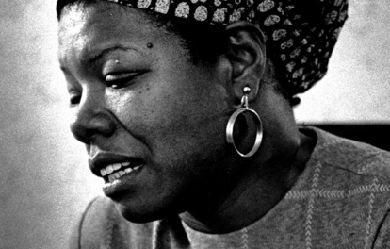
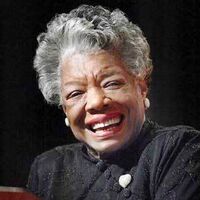
Maya Angelou (born Marguerite Ann Johnson; April 4, 1928 – May 28, 2014) was an American author and poet. She published seven autobiographies, three books of essays, and several books of poetry, and is credited with a list of plays, movies, and television shows spanning more than fifty years. She received dozens of awards and over thirty honorary doctoral degrees. Angelou is best known for her series of seven autobiographies, which focus on her childhood and early adult experiences. The first, I Know Why the Caged Bird Sings (1969), tells of her life up to the age of seventeen, and brought her international recognition and acclaim. Angelou's long list of occupations has included pimp, prostitute, night-club dancer and performer, cast-member of the musical Porgy and Bess, coordinator for Martin Luther King, Jr.'s Southern Christian Leadership Conference, author, journalist in Egypt and Ghana during the days of decolonization, and actor, writer, director, and producer of plays, movies, and public television programs.
▪️▪️▪️▪️▪️▪️▪️▪️▪️▪️ ▪️▪️▪️▪️▪️▪️▪️▪️ ▪️▪️▪️▪️▪️▪️ ▪️▪️▪️▪️ ▪️▪️▪️ ▪️▪️ ▪️ Finding my way with writing and poetry. 🪶The world makes more sense with poetry. Connect with me on: Tumblr: 1introvertedsage My Poetic Side: Introverted Sage All Poetry: Introverted Sage Substack: Introverted Sage
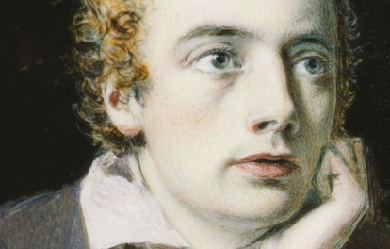
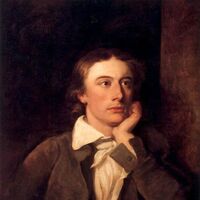
English Romantic poet John Keats was born on October 31, 1795, in London. The oldest of four children, he lost both his parents at a young age. His father, a livery-stable keeper, died when Keats was eight; his mother died of tuberculosis six years later. After his mother's death, Keats's maternal grandmother appointed two London merchants, Richard Abbey and John Rowland Sandell, as guardians. Abbey, a prosperous tea broker, assumed the bulk of this responsibility, while Sandell played only a minor role. When Keats was fifteen, Abbey withdrew him from the Clarke School, Enfield, to apprentice with an apothecary-surgeon and study medicine in a London hospital. In 1816 Keats became a licensed apothecary, but he never practiced his profession, deciding instead to write poetry.
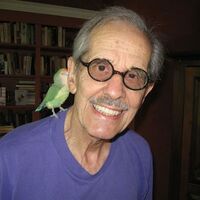
I was born in Hamilton, Ohio, in 1925, a confession that I am an old geezer. I served in the infantry during World War II, was wounded and discharged in 1946. I then obtained a B.A. degree with honors in English in 1949. Subsequently I taught in Cincinnati public schools and at the University of Cincinnati for the next 35 years. My poetry has appeared in: * Wall Street Journal * Hellas * Lyric * Envoi * Midwest Poetry Review (a sonnet won awards) * Aethlon * Light * Poet's View * Classical Outlook * Mind over Matter Several books have been self-published but Wormwood and Whines, a compilation of many of my poems, was published by Superior Books in 1999.
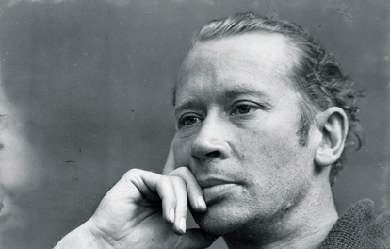
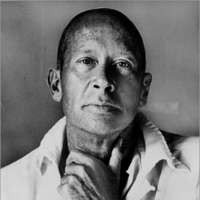
Edward Estlin Cummings (October 14, 1894 – September 3, 1962), popularly known as E. E. Cummings, with the abbreviated form of his name often written by others in lowercase letters as e.e. cummings (in the style of some of his poems—see name and capitalization, below), was an American poet, painter, essayist, author, and playwright. His body of work encompasses approximately 2,900 poems, two autobiographical novels, four plays and several essays, as well as numerous drawings and paintings. He is remembered as a preeminent voice of 20th century poetry.
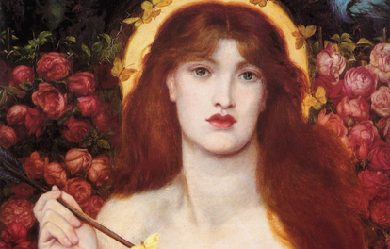

Dante Gabriel Rossetti (12 May 1828 – 9 April 1882) was an English poet, illustrator, painter and translator. He founded the Pre-Raphaelite Brotherhood in 1848 with William Holman Hunt and John Everett Millais, and was later to be the main inspiration for a second generation of artists and writers influenced by the movement, most notably William Morris and Edward Burne-Jones. His work also influenced the European Symbolists and was a major precursor of the Aesthetic movement.
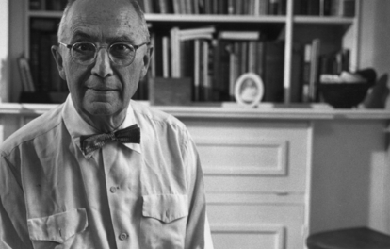
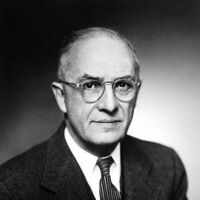
William Carlos Williams (September 17, 1883 – March 4, 1963) was an American poet closely associated with modernism and Imagism. He was also a pediatrician and general practitioner of medicine with a medical degree from the University of Pennsylvania School of Medicine. Williams "worked harder at being a writer than he did at being a physician" but excelled at both. Although his primary occupation was as a family doctor, Williams had a successful literary career as a poet. In addition to poetry (his main literary focus), he occasionally wrote short stories, plays, novels, essays, and translations. He practiced medicine by day and wrote at night. Early in his career, he briefly became involved in the Imagist movement through his friendships with Ezra Pound and H.D. (also known as Hilda Doolittle, another well-known poet whom he befriended while attending the University of Pennsylvania), but soon he began to develop opinions that differed from those of his poet/friends.

I started dabbling at age 13, and after a while, I was writing full poems, however, I only have poetry from when I was 16 and up. I am now 28, and I have found that it is so much easier to say things through poetry than it is to verbalize them. I draw inspiration for my poetry from writers, musicians, movies, daily interactions, my faith, and much more. As far as writers go, when I was younger I got introduced to Langston Hughes, and I have learned to take from his style of writing. I also enjoy some good old Shakespeare every once in a while. Most of my influence, however, comes from music; I draw my influence from genres that include but are not limited to, hip-hop, folk, rock, and country. Another thing that really impacts my poetry are events that have taken place in my life. Movie characters and themes also have a chance to have their fair share of influence in my poetry. I am a Christ-follower first and foremost, so, beneath most of my poems stories, there is a spiritual undertone. My plainly faith-based poems, however, are a written (hard) memory of the headspace that I was in at that time in my life. People can create all sorts of art without having to fabricate who they are, and without compromising who they are as a person; it's being able to take from other peoples experiences and write about them, based on the writer's interpretation, that can set a writer apart from others. I write mainly Free Verse poetry, because to me poetry is a lot of self-expression, and if I were to follow the set guidelines of a certain type of poetry, I would then be forfeiting my creative license. Sometimes, however, I like to take from certain styles of poetry, especially when I am trying to convey a particular emotion, for example, I not only write Free Verse but, I also have learned to take from styles, such as Blank Verse & Limericks. I have a friend who said this, "If there is one thing I have learned about writing over the years it is that the best work comes from writing without the audience in mind." I find this quote to be accurate for not only my writing but for writing in general. Love y'all!

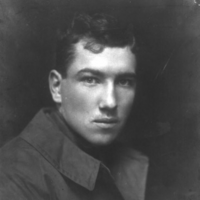
On July 24, 1895, Robert Graves was born in Wimbledon, near London. His father, Alfred Perceval Graves, was a Gaelic scholar and minor Irish poet. His mother, Amalie von Ranke Graves, was a relation of Leopold von Ranke, one of the founding fathers of modern historical studies. One of ten children, Robert was greatly influenced by his mother's puritanical beliefs and his father's love of Celtic poetry and myth. As a young man, he was more interested in boxing and mountain climbing than studying, although poetry later sustained him through a turbulent adolescence. In 1913 Graves won a scholarship to continue his studies at St. John's College, Oxford, but in August 1914 he enlisted as a junior officer in the Royal Welch Fusiliers. He fought in the Battle of Loos and was injured in the Somme offensive in 1916. While convalescing, he published his first collection of poetry, Over the Brazier. By 1917, though still an active serviceman, Graves had published three volumes. In 1918, he spent a year in the trenches, where he was again severely wounded. In January 1918, at the age of twenty-two, he married eighteen-year-old Nancy Nicholson, with whom he was to have four children. Traumatized by the war, he went to Oxford with his wife and took a position at St. John's College. Graves's early volumes of poetry, like those of his contemporaries, deal with natural beauty and bucolic pleasures, and with the consequences of the First World War. Over the Brazier and Fairies and Fusiliers earned for Graves the reputation as an accomplished war poet. After meeting the American poet and theorist Laura Riding in 1926, Graves's poetry underwent a significant transformation. Douglas Day has written that the "influence of Laura Riding is quite possibly the most important single element in [Graves's] poetic career: she persuaded him to curb his digressiveness and his rambling philosophizing and to concentrate instead on terse, ironic poems written on personal themes." In 1927, Graves and his first wife separated permanently, and in 1929 he published Goodbye to All That, an autobiography that announced his psychological accommodation with the residual horror of his war experiences. Shortly afterward, he departed to Majorca with Laura Riding. In addition to completing many books of verse while in Majorca, Graves also wrote several volumes of criticism, some in collaboration with Riding. The couple cofounded Seizin Press in 1928 and Epilogue, a semiannual magazine, in 1935. During that period, he evolved his theory of poetry as spiritually cathartic to both the poet and the reader. Although Graves claimed that he wrote novels only to earn money, it was through these that he attained status as a major writer in 1934, with the publication of the historical novel I, Claudius, and its sequel, Claudius the God and His Wife Messalina. (During the 1970's, the BBC adapted the novels into an internationally popular television series.) At the onset of the Spanish Civil War in 1936, Graves and Riding fled Majorca, eventually settling in America. In 1939, Laura Riding left Graves for the writer Schuyler Jackson; one year later Graves began a relationship with Beryl Hodge that was to last until his death. It was in the 1940s, after his break with Riding, that Graves formulated his personal mythology of the White Goddess. Inspired by late nineteenth-century studies of matriarchal societies and goddess cults, this mythology was to pervade all of his later work. After World War II, Graves returned to Majorca, where he lived with Hodge and continued to write. By the 1950s, Graves had won an enormous international reputation as a poet, novelist, literary scholar, and translator. In 1962, W. H. Auden went as far as to assert that Graves was England's "greatest living poet." In 1968, he received the Queen's Gold Medal for Poetry. During his lifetime he published more than 140 books, including fifty-five collections of poetry (he reworked his Collected Poems repeatedly during his career), fifteen novels, ten translations, and forty works of nonfiction, autobiography, and literary essays. From 1961 to 1966, Graves returned to England to serve as a professor of poetry at Oxford. In the 1970s his productivity fell off; and the last decade of his life was lost in silence and senility. Robert Graves died in Majorca in 1985, at the age of ninety. Poetry * Over the Brazier (1916) * Goliath and David (1917) * Fairies and Fusiliers (1918) * Treasure Box (1920) * Country Sentiment (1920) * The Pier-Glass (1921) * Whipperginny (1923) * To Whom Else? Deyá (1931) * The Poems of Robert Graves (1958) * Man Does, Woman Is (1964) * Love Respelt (1966) * Poems About Love (1969) * Love Respelt Again (1969) * Poems: Abridged for Dolls and Princes (1971) * Poems 1970-1972 (1973) * New Collected Poems (1977) * The Complete Poems, ed. Beryl Graves and Dunstan Ward (2000) References Poets.org - www.poets.org/poet.php/prmPID/193


I was born with verse in my blood. I was raised with poetry mixed in with my mother's milk. We were immersed in poetry from our school days; we were taught to read it, appreciate it, glean wisdom from it, knew all the poets of old by heart...Ironcally, in my culture, writing poetry is the high art and privilege of men seasoned by age and gifted by Creator with this rare talent; it was not for the young to 'fool around' with, so we were not taught or encouraged to express ourselves through verse. So I never knew I had it... It was in my young adulthood that I started to feel the Song of the heart stirring in me. A friend shared with me his poetry, showed me that we all have the capability, if only we tune into ourselves and listen. The first few tentative poems were born from under my pen. Then life happened, I tuned out, forgot that part of myself, shut the door on it for more than a decade. I do not know what prompted for my Song to resurface, one day it just started pouring out of me, but I am grateful for the reawakening of that part of my soul that I'd given up for lost, as well as for the people around me who fuel my inspiration. Whether intentionally or not, they keep the fire burning. An enormous Thank You to all of you for reading, commenting, sharing and inspiring. This is a wonderful and nurturing community for all aspiring poets. Prose is the language of the mind, poetry is the language of the soul.
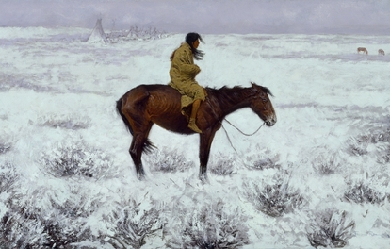
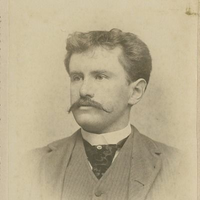
William Sydney Porter (September 11, 1862– June 5, 1910), known by his pen name O. Henry, was an American short story writer. His stories are known for their surprise endings. Biography Early life William Sidney Porter was born on September 11, 1862, in Greensboro, North Carolina. He changed the spelling of his middle name to Sydney in 1898. His parents were Dr. Algernon Sidney Porter (1825–88), a physician, and Mary Jane Virginia Swaim Porter (1833–65). William’s parents had married on April 20, 1858. When William was three, his mother died from tuberculosis, and he and his father moved into the home of his paternal grandmother. As a child, Porter was always reading, everything from classics to dime novels; his favorite works were Lane’s translation of One Thousand and One Nights and Burton’s Anatomy of Melancholy. Porter graduated from his aunt Evelina Maria Porter’s elementary school in 1876. He then enrolled at the Lindsey Street High School. His aunt continued to tutor him until he was fifteen. In 1879, he started working in his uncle’s drugstore in Greensboro, and on August 30, 1881, at the age of nineteen, Porter was licensed as a pharmacist. At the drugstore, he also showed off his natural artistic talents by sketching the townsfolk. Move to Texas Porter traveled with Dr. James K. Hall to Texas in March 1882, hoping that a change of air would help alleviate a persistent cough he had developed. He took up residence on the sheep ranch of Richard Hall, James’ son, in La Salle County and helped out as a shepherd, ranch hand, cook, and baby-sitter. While on the ranch, he learned bits of Spanish and German from the mix of immigrant ranch hands. He also spent time reading classic literature. Porter’s health did improve. He traveled with Richard to Austin in 1884, where he decided to remain and was welcomed into the home of Richard’s friends, Joseph Harrell and his wife. Porter resided with the Harrells for three years. He went to work briefly for the Morley Brothers Drug Company as a pharmacist. Porter then moved on to work for the Harrell Cigar Store located in the Driskill Hotel. He also began writing as a sideline and wrote many of his early stories in the Harrell house. As a young bachelor, Porter led an active social life in Austin. He was known for his wit, story-telling and musical talents. He played both the guitar and mandolin. He sang in the choir at St. David’s Episcopal Church and became a member of the “Hill City Quartette”, a group of young men who sang at gatherings and serenaded young women of the town. Porter met and began courting Athol Estes, then seventeen years old and from a wealthy family. Historians believe Porter met Athol at the laying of the cornerstone of the Texas State Capitol on March 2, 1885. Her mother objected to the match because Athol was ill, suffering from tuberculosis. On July 1, 1887, Porter eloped with Athol and were married in the parlor of the home of Reverend R. K. Smoot, pastor of the Central Presbyterian Church, where the Estes family attended church. The couple continued to participate in musical and theater groups, and Athol encouraged her husband to pursue his writing. Athol gave birth to a son in 1888, who died hours after birth, and then a daughter, Margaret Worth Porter, in September 1889. Porter’s friend Richard Hall became Texas Land Commissioner and offered Porter a job. Porter started as a draftsman at the Texas General Land Office (GLO) on January 12, 1887 at a salary of $100 a month, drawing maps from surveys and fieldnotes. The salary was enough to support his family, but he continued his contributions to magazines and newspapers. In the GLO building, he began developing characters and plots for such stories as “Georgia’s Ruling” (1900), and “Buried Treasure” (1908). The castle-like building he worked in was even woven into some of his tales such as "Bexar Scrip No. 2692" (1894). His job at the GLO was a political appointment by Hall. Hall ran for governor in the election of 1890 but lost. Porter resigned on January 21, 1891, the day after the new governor, Jim Hogg, was sworn in. The same year, Porter began working at the First National Bank of Austin as a teller and bookkeeper at the same salary he had made at the GLO. The bank was operated informally, and Porter was apparently careless in keeping his books and may have embezzled funds. In 1894, he was accused by the bank of embezzlement and lost his job but was not indicted at the time. He then worked full-time on his humorous weekly called The Rolling Stone, which he started while working at the bank. The Rolling Stone featured satire on life, people and politics and included Porter’s short stories and sketches. Although eventually reaching a top circulation of 1500, The Rolling Stone failed in April 1895, since the paper never provided an adequate income. However, his writing and drawings had caught the attention of the editor at the Houston Post. Porter and his family moved to Houston in 1895, where he started writing for the Post. His salary was only $25 a month, but it rose steadily as his popularity increased. Porter gathered ideas for his column by loitering in hotel lobbies and observing and talking to people there. This was a technique he used throughout his writing career. While he was in Houston, federal auditors audited the First National Bank of Austin and found the embezzlement shortages that led to his firing. A federal indictment followed, and he was arrested on charges of embezzlement. Flight and return Porter’s father-in-law posted bail to keep him out of jail. He was due to stand trial on July 7, 1896, but the day before, as he was changing trains to get to the courthouse, an impulse hit him. He fled, first to New Orleans and later to Honduras, with which the United States had no extradition treaty at that time. William lived in Honduras for only six months, until January 1897. There he became friends with Al Jennings, a notorious train robber, who later wrote a book about their friendship. He holed up in a Trujillo hotel, where he wrote Cabbages and Kings, in which he coined the term “banana republic” to qualify the country, a phrase subsequently used widely to describe a small, unstable tropical nation in Latin America with a narrowly focused, agrarian economy. Porter had sent Athol and Margaret back to Austin to live with Athol’s parents. Unfortunately, Athol became too ill to meet Porter in Honduras as he had planned. When he learned that his wife was dying, Porter returned to Austin in February 1897 and surrendered to the court, pending trial. Athol Estes Porter died from tuberculosis (then known as consumption) on July 25, 1897. Porter had little to say in his own defense at his trial and was found guilty on February 17, 1898 of embezzling $854.08. He was sentenced to five years in prison and imprisoned on March 25, 1898, at the Ohio Penitentiary in Columbus, Ohio. Porter was a licensed pharmacist and was able to work in the prison hospital as the night druggist. He was given his own room in the hospital wing, and there is no record that he actually spent time in the cell block of the prison. He had fourteen stories published under various pseudonyms while he was in prison but was becoming best known as “O. Henry”, a pseudonym that first appeared over the story “Whistling Dick’s Christmas Stocking” in the December 1899 issue of McClure’s Magazine. A friend of his in New Orleans would forward his stories to publishers so that they had no idea that the writer was imprisoned. Porter was released on July 24, 1901, for good behavior after serving three years. He reunited with his daughter Margaret, now age 11, in Pittsburgh, Pennsylvania, where Athol’s parents had moved after Porter’s conviction. Margaret was never told that her father had been in prison—just that he had been away on business. Later life and death Porter’s most prolific writing period started in 1902, when he moved to New York City to be near his publishers. While there, he wrote 381 short stories. He wrote a story a week for over a year for the New York World Sunday Magazine. His wit, characterization, and plot twists were adored by his readers but often panned by critics. Porter married again in 1907 to childhood sweetheart Sarah (Sallie) Lindsey Coleman, whom he met again after revisiting his native state of North Carolina. Sarah Lindsey Coleman was herself a writer and wrote a romanticized and fictionalized version of their correspondence and courtship in her novella Wind of Destiny. Porter was a heavy drinker, and by 1908, his markedly deteriorating health affected his writing. In 1909, Sarah left him, and he died on June 5, 1910, of cirrhosis of the liver, complications of diabetes, and an enlarged heart. After funeral services in New York City, he was buried in the Riverside Cemetery in Asheville, North Carolina. His daughter, Margaret Worth Porter, had a short writing career from 1913 to 1916. She married cartoonist Oscar Cesare of New York in 1916; they were divorced four years later. She died of tuberculosis in 1927 and is buried next to her father. Stories O. Henry’s stories frequently have surprise endings. In his day he was called the American answer to Guy de Maupassant. While both authors wrote plot twist endings, O. Henry’s stories were considerably more playful. His stories are also known for witty narration. Most of O. Henry’s stories are set in his own time, the early 20th century. Many take place in New York City and deal for the most part with ordinary people: policemen, waitresses, etc. O. Henry’s work is wide-ranging, and his characters can be found roaming the cattle-lands of Texas, exploring the art of the con-man, or investigating the tensions of class and wealth in turn-of-the-century New York. O. Henry had an inimitable hand for isolating some element of society and describing it with an incredible economy and grace of language. Some of his best and least-known work is contained in Cabbages and Kings, a series of stories each of which explores some individual aspect of life in a paralytically sleepy Central American town, while advancing some aspect of the larger plot and relating back one to another. Cabbages and Kings was his first collection of stories, followed by The Four Million. The second collection opens with a reference to Ward McAllister’s “assertion that there were only 'Four Hundred’ people in New York City who were really worth noticing. But a wiser man has arisen—the census taker—and his larger estimate of human interest has been preferred in marking out the field of these little stories of the ‘Four Million.’” To O. Henry, everyone in New York counted. He had an obvious affection for the city, which he called “Bagdad-on-the-Subway”, and many of his stories are set there—while others are set in small towns or in other cities. His final work was “Dream”, a short story intended for the magazine The Cosmopolitan but left incomplete at the time of his death. Among his most famous stories are: “The Gift of the Magi” about a young couple, Jim and Della, who are short of money but desperately want to buy each other Christmas gifts. Unbeknownst to Jim, Della sells her most valuable possession, her beautiful hair, in order to buy a platinum fob chain for Jim’s watch; while unbeknownst to Della, Jim sells his own most valuable possession, his watch, to buy jeweled combs for Della’s hair. The essential premise of this story has been copied, re-worked, parodied, and otherwise re-told countless times in the century since it was written. “The Ransom of Red Chief”, in which two men kidnap a boy of ten. The boy turns out to be so bratty and obnoxious that the desperate men ultimately pay the boy’s father $250 to take him back. “The Cop and the Anthem” about a New York City hobo named Soapy, who sets out to get arrested so that he can be a guest of the city jail instead of sleeping out in the cold winter. Despite efforts at petty theft, vandalism, disorderly conduct, and “mashing” with a young prostitute, Soapy fails to draw the attention of the police. Disconsolate, he pauses in front of a church, where an organ anthem inspires him to clean up his life—and is ironically charged for loitering and sentenced to three months in prison. “A Retrieved Reformation”, which tells the tale of safecracker Jimmy Valentine, recently freed from prison. He goes to a town bank to case it before he robs it. As he walks to the door, he catches the eye of the banker’s beautiful daughter. They immediately fall in love and Valentine decides to give up his criminal career. He moves into the town, taking up the identity of Ralph Spencer, a shoemaker. Just as he is about to leave to deliver his specialized tools to an old associate, a lawman who recognizes him arrives at the bank. Jimmy and his fiancée and her family are at the bank, inspecting a new safe when a child accidentally gets locked inside the airtight vault. Knowing it will seal his fate, Valentine opens the safe to rescue the child. However, much to Valentine’s surprise, the lawman denies recognizing him and lets him go. “The Duplicity of Hargraves”. A short story about a nearly destitute father and daughter’s trip to Washington, D.C. “The Caballero’s Way”, in which Porter’s most famous character, the Cisco Kid, is introduced. It was first published in 1907 in the July issue of Everybody’s Magazine and collected in the book Heart of the West that same year. In later film and TV depictions, the Kid would be portrayed as a dashing adventurer, perhaps skirting the edges of the law, but primarily on the side of the angels. In the original short story, the only story by Porter to feature the character, the Kid is a murderous, ruthless border desperado, whose trail is dogged by a heroic Texas Ranger. The twist ending is, unusually for Porter, tragic. Pen name Porter used a number of pen names (including “O. Henry” or “Olivier Henry”) in the early part of his writing career; other names included S.H. Peters, James L. Bliss, T.B. Dowd, and Howard Clark. Nevertheless, the name “O. Henry” seemed to garner the most attention from editors and the public, and was used exclusively by Porter for his writing by about 1902. He gave various explanations for the origin of his pen name. In 1909 he gave an interview to The New York Times, in which he gave an account of it: It was during these New Orleans days that I adopted my pen name of O. Henry. I said to a friend: “I’m going to send out some stuff. I don’t know if it amounts to much, so I want to get a literary alias. Help me pick out a good one.” He suggested that we get a newspaper and pick a name from the first list of notables that we found in it. In the society columns we found the account of a fashionable ball. “Here we have our notables,” said he. We looked down the list and my eye lighted on the name Henry, “That’ll do for a last name,” said I. “Now for a first name. I want something short. None of your three-syllable names for me.” “Why don’t you use a plain initial letter, then?” asked my friend. “Good,” said I, “O is about the easiest letter written, and O it is.” A newspaper once wrote and asked me what the O stands for. I replied, “O stands for Olivier, the French for Oliver.” And several of my stories accordingly appeared in that paper under the name Olivier Henry. William Trevor writes in the introduction to The World of O. Henry: Roads of Destiny and Other Stories (Hodder & Stoughton, 1973) that “there was a prison guard named Orrin Henry” in the Ohio State Penitentiary “whom William Sydney Porter... immortalised as O. Henry”. According to J. F. Clarke, it is from the name of the French pharmacist Etienne Ossian Henry, whose name is in the U. S. Dispensary which Porter used working in the prison pharmacy. Writer and scholar Guy Davenport offers his own hypothesis: “The pseudonym that he began to write under in prison is constructed from the first two letters of Ohio and the second and last two of penitentiary.” Legacy The O. Henry Award is a prestigious annual prize named after Porter and given to outstanding short stories. A film was made in 1952 featuring five stories, called O. Henry’s Full House. The episode garnering the most critical acclaim was “The Cop and the Anthem” starring Charles Laughton and Marilyn Monroe. The other stories are “The Clarion Call”, “The Last Leaf”, “The Ransom of Red Chief” (starring Fred Allen and Oscar Levant), and “The Gift of the Magi”. The O. Henry House and O. Henry Hall, both in Austin, Texas, are named for him. O. Henry Hall, now owned by the Texas State University System, previously served as the federal courthouse in which O. Henry was convicted of embezzlement. Porter has elementary schools named for him in Greensboro, North Carolina (William Sydney Porter Elementary) and Garland, Texas (O. Henry Elementary), as well as a middle school in Austin, Texas (O. Henry Middle School). The O. Henry Hotel in Greensboro is also named for Porter, as is US 29 which is O. Henry Boulevard. In 1962, the Soviet Postal Service issued a stamp commemorating O. Henry’s 100th birthday. On September 11, 2012, the U.S. Postal Service issued a stamp commemorating the 150th anniversary of O. Henry’s birth. On November 23, 2011, Barack Obama quoted O. Henry while granting pardons to two turkeys named “Liberty” and “Peace”. In response, political science professor P. S. Ruckman, Jr., and Texas attorney Scott Henson filed a formal application for a posthumous pardon in September 2012, the same month that the U.S. Postal Service issued its O. Henry stamp. Previous attempts were made to obtain such a pardon for Porter in the administrations of Woodrow Wilson, Dwight Eisenhower, and Ronald Reagan, but no one had ever bothered to file a formal application. Ruckman and Henson argued that Porter deserved a pardon because (1) he was a law-abiding citizen prior to his conviction; (2) his offense was minor; (3) he had an exemplary prison record; (4) his post-prison life clearly indicated rehabilitation; (5) he would have been an excellent candidate for clemency in his time, had he but applied for pardon; (6) by today’s standards, he remains an excellent candidate for clemency; and (7) his pardon would be a well-deserved symbolic gesture and more. O. Henry’s love of language inspired the O. Henry Pun-Off, an annual spoken word competition began in 1978 that takes place at the O. Henry House. Bibliography * Cabbages and Kings (1904) * The Four Million (1906), short stories * The Trimmed Lamp (1907), short stories: “The Trimmed Lamp”, “A Madison Square Arabian Night”, “The Rubaiyat of a Scotch Highball”, “The Pendulum”, “Two Thanksgiving Day Gentlemen”, “The Assessor of Success”, “The Buyer from Cactus City”, “The Badge of Policeman O’Roon”, “Brickdust Row”, “The Making of a New Yorker”, “Vanity and Some Sables”, “The Social Triangle”, “The Purple Dress”, "The Foreign Policy of Company 99", “The Lost Blend”, “A Harlem Tragedy”, “'The Guilty Party’”, “According to Their Lights”, “A Midsummer Knight’s Dream”, “The Last Leaf”, “The Count and the Wedding Guest”, “The Country of Elusion”, “The Ferry of Unfulfilment”, “The Tale of a Tainted Tenner”, “Elsie in New York” * Heart of the West (1907), short stories: “Hearts and Crosses”, “The Ransom of Mack”, “Telemachus, Friend”, “The Handbook of Hymen”, “The Pimienta Pancakes”, “Seats of the Haughty”, “Hygeia at the Solito”, “An Afternoon Miracle”, “The Higher Abdication”, "Cupid à la Carte", “The Caballero’s Way”, “The Sphinx Apple”, “The Missing Chord”, “A Call Loan”, “The Princess and the Puma”, “The Indian Summer of Dry Valley Johnson”, “Christmas by Injunction”, “A Chaparral Prince”, “The Reformation of Calliope” * The Voice of the City (1908), short stories: “The Voice of the City”, “The Complete Life of John Hopkins”, “A Lickpenny Lover”, “Dougherty’s Eye-opener”, “'Little Speck in Garnered Fruit’”, “The Harbinger”, “While the Auto Waits”, “A Comedy in Rubber”, “One Thousand Dollars”, “The Defeat of the City”, “The Shocks of Doom”, “The Plutonian Fire”, “Nemesis and the Candy Man”, “Squaring the Circle”, “Roses, Ruses and Romance”, “The City of Dreadful Night”, “The Easter of the Soul”, “The Fool-killer”, “Transients in Arcadia”, “The Rathskeller and the Rose”, “The Clarion Call”, “Extradited from Bohemia”, “A Philistine in Bohemia”, “From Each According to His Ability”, “The Memento” * The Gentle Grafter (1908), short stories: “The Octopus Marooned”, “Jeff Peters as a Personal Magnet”, “Modern Rural Sports”, “The Chair of Philanthromathematics”, “The Hand That Riles the World”, “The Exact Science of Matrimony”, “A Midsummer Masquerade”, “Shearing the Wolf”, “Innocents of Broadway”, “Conscience in Art”, “The Man Higher Up”, “Tempered Wind”, “Hostages to Momus”, “The Ethics of Pig” * Roads of Destiny (1909), short stories: “Roads of Destiny”, “The Guardian of the Accolade”, “The Discounters of Money”, “The Enchanted Profile”, “Next to Reading Matter”, “Art and the Bronco”, "Phœbe", “A Double-dyed Deceiver”, “The Passing of Black Eagle”, “A Retrieved Reformation”, “Cherchez la Femme”, “Friends in San Rosario”, “The Fourth in Salvador”, “The Emancipation of Billy”, “The Enchanted Kiss”, “A Departmental Case”, “The Renaissance at Charleroi”, “On Behalf of the Management”, “Whistling Dick’s Christmas Stocking”, “The Halberdier of the Little Rheinschloss”, “Two Renegades”, “The Lonesome Road” * Options (1909), short stories: “'The Rose of Dixie’”, “The Third Ingredient”, “The Hiding of Black Bill”, “Schools and Schools”, “Thimble, Thimble”, “Supply and Demand”, “Buried Treasure”, “To Him Who Waits”, “He Also Serves”, “The Moment of Victory”, “The Head-hunter”, “No Story”, “The Higher Pragmatism”, “Best-seller”, “Rus in Urbe”, “A Poor Rule” * Strictly Business (1910), short stories: “Strictly Business”, “The Gold That Glittered”, “Babes in the Jungle”, “The Day Resurgent”, “The Fifth Wheel”, “The Poet and the Peasant”, “The Robe of Peace”, “The Girl and the Graft”, “The Call of the Tame”, “The Unknown Quantity”, “The Thing’s the Play”, “A Ramble in Aphasia”, “A Municipal Report”, “Psyche and the Pskyscraper”, “A Bird of Bagdad”, “Compliments of the Season”, “A Night in New Arabia”, “The Girl and the Habit”, “Proof of the Pudding”, “Past One at Rooney’s”, “The Venturers”, “The Duel”, “'What You Want’” * Whirligigs (1910), short stories: “The World and the Door”, “The Theory and the Hound”, “The Hypotheses of Failure”, “Calloway’s Code”, “A Matter of Mean Elevation”, “Girl”, “Sociology in Serge and Straw”, “The Ransom of Red Chief”, “The Marry Month of May”, “A Technical Error”, “Suite Homes and Their Romance”, “The Whirligig of Life”, “A Sacrifice Hit”, “The Roads We Take”, “A Blackjack Bargainer, ”The Song and the Sergeant", “One Dollar’s Worth”, “A Newspaper Story”, “Tommy’s Burglar”, “A Chaparral Christmas Gift”, “A Little Local Colour”, “Georgia’s Ruling”, “Blind Man’s Holiday”, “Madame Bo-Peep of the Ranches” * Sixes and Sevens (1911), short stories: “The Last of the Troubadours”, “The Sleuths”, “Witches’ Loaves”, “The Pride of the Cities”, “Holding Up a Train”, “Ulysses and the Dogman”, “The Champion of the Weather”, “Makes the Whole World Kin”, “At Arms with Morpheus”, “A Ghost of a Chance”, “Jimmy Hayes and Muriel”, “The Door of Unrest”, “The Duplicity of Hargraves”, “Let Me Feel Your Pulse”, “October and June”, “The Church with an Overshot-Wheel”, “New York by Camp Fire Light”, “The Adventures of Shamrock Jolnes”, “The Lady Higher Up”, “The Greater Coney”, “Law and Order”, “Transformation of Martin Burney”, “The Caliph and the Cad”, “The Diamond of Kali”, “The Day We Celebrate” * Rolling Stones (1912), short stories: “The Dream”, “A Ruler of Men”, “The Atavism of John Tom Little Bear”, “Helping the Other Fellow”, “The Marionettes”, “The Marquis and Miss Sally”, “A Fog in Santone”, “The Friendly Call”, “A Dinner at———”, “Sound and Fury”, “Tictocq”, “Tracked to Doom”, “A Snapshot at the President”, “An Unfinished Christmas Story”, “The Unprofitable Servant”, “Aristocracy Versus Hash”, “The Prisoner of Zembla”, “A Strange Story”, “Fickle Fortune, or How Gladys Hustled”, “An Apology”, “Lord Oakhurst’s Curse”, "Bexar Scrip No. 2692” * Waifs and Strays (1917), short stories References Wikipedia—https://en.wikipedia.org/wiki/O._Henry
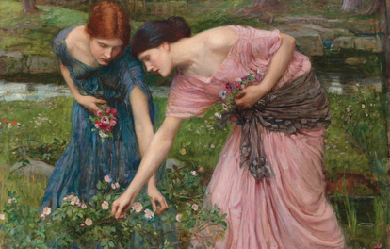
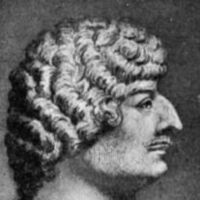
Robert Herrick (baptized 24 August 1591 – buried 15 October 1674) was a 17th-century English poet. Born in Cheapside, London, he was the seventh child and fourth son of Julia Stone and Nicholas Herrick, a prosperous goldsmith. His father died in a fall from a fourth-floor window in November 1592, when Robert was a year old (whether this was suicide remains unclear). The tradition that Herrick received his education at Westminster is groundless. It is more likely that (like his uncle's children) he attended The Merchant Taylors' School. In 1607 he became apprenticed to his uncle, Sir William Herrick, who was a goldsmith and jeweler to the king. The apprenticeship ended after only six years when Herrick, at age twenty-two, matriculated at St John's College, Cambridge. He graduated in 1617. Robert Herrick became a member of the Sons of Ben, a group centered upon an admiration for the works of Ben Jonson. Herrick wrote at least five poems to Jonson. Herrick took holy orders in 1623, and in 1629 he became vicar of Dean Prior in Devonshire. In 1647, in the wake of the English Civil War, Herrick was ejected from his vicarage for refusing the Solemn League and Covenant. He then returned to London, living in Westminster and depending on the charity of his friends and family. He spent some time preparing his lyric poems for publication, and had them printed in 1648 under the title Hesperides; or the Works both Human and Divine of Robert Herrick, with a dedication to the Prince of Wales. When King Charles II was restored to the throne in 1660, Herrick petitioned for his own restoration to his living. Perhaps King Charles felt kindly towards this genial man, who had written verses celebrating the births of both Charles II and his brother James before the Civil War. Herrick became the vicar of Dean Prior again in the summer of 1662 and lived there until his death in October 1674, at the ripe age of 83. His date of death is not known, but he was buried on 15 October. Herrick was a bachelor all his life, and many of the women he names in his poems are thought to be fictional. Poetic style and stature Herrick wrote over 2,500 poems, about half of which appear in his major work, Hesperides. Hesperides also includes the much shorter Noble Numbers, his first book, of spiritual works, first published in 1647. He is well-known for his style and, in his earlier works, frequent references to lovemaking and the female body. His later poetry was more of a spiritual and philosophical nature. Among his most famous short poetical sayings are the unique monometers, such as "Thus I / Pass by / And die,/ As one / Unknown / And gone." Herrick sets out his subject-matter in the poem he printed at the beginning of his collection, The Argument of his Book. He dealt with English country life and its seasons, village customs, complimentary poems to various ladies and his friends, themes taken from classical writings and a solid bedrock of Christian faith, not intellectualized but underpinning the rest. Herrick never married, and none of his love-poems seem to connect directly with any one beloved woman. He loved the richness of sensuality and the variety of life, and this is shown vividly in such poems as Cherry-ripe, Delight in Disorder and Upon Julia’s Clothes. The over-riding message of Herrick’s work is that life is short, the world is beautiful, love is splendid, and we must use the short time we have to make the most of it. This message can be seen clearly in To the Virgins, to make much of Time, To Daffodils, To Blossoms and Corinna going a-Maying, where the warmth and exuberance of what seems to have been a kindly and jovial personality comes over strongly. The opening stanza in one of his more famous poems, "To the Virgins, to Make Much of Time", is as follows: Gather ye rosebuds while ye may, Old Time is still a-flying; And this same flower that smiles today, Tomorrow will be dying. This poem is an example of the carpe diem genre; the popularity of Herrick's poems of this kind helped revive the genre. His poems were not widely popular at the time they were published. His style was strongly influenced by Ben Jonson, by the classical Roman writers, and by the poems of the late Elizabethan era. This must have seemed quite old-fashioned to an audience whose tastes were tuned to the complexities of the metaphysical poets such as John Donne and Andrew Marvell. His works were rediscovered in the early nineteenth century, and have been regularly printed ever since. The Victorian poet Swinburne described Herrick as the greatest song writer...ever born of English race. It is certainly true that despite his use of classical allusions and names, his poems are easier for modern readers to understand than those of many of his contemporaries. Robert Herrick is a major character in Rose Macaulay's 1932 historical novel, They Were Defeated. References Wikipedia - http://en.wikipedia.org/wiki/Robert_Herrick_(poet)

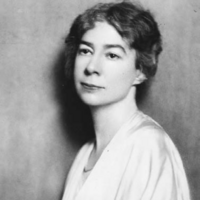
Sara Teasdale (August 8, 1884 – January 29, 1933) was an American lyric poet. She was born Sarah Trevor Teasdale in St. Louis, Missouri, and used the name Sara Teasdale Filsinger after her marriage in 1914. She had such poor health for so much of her childhood, home schooled until age 9, that it was only at age 10 that she was well enough to begin school. She started at Mary Institute in 1898, but switched to Hosmer Hall in 1899, graduating in 1903. I Shall Not Care WHEN I am dead and over me bright April Shakes out her rain-drenched hair, Tho' you should lean above me broken-hearted, I shall not care. I shall have peace, as leafy trees are peaceful When rain bends down the bough, And I shall be more silent and cold-hearted Than you are now.

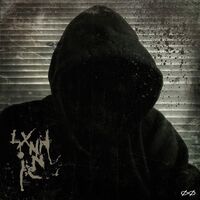
Lonnie Rutledge is a prolific artist, songwriter, and poet from the United States. He is known for his peculiar methods, intense concepts, experimental writing and often demented production. He has described his style as 'Schizodelic'; a term he is noted for coining in the mid 1990's. Lxnnnie has released many albums under assorted aliases in multiple genres of music. He has had songs featured in major motion pictures, produced music for a number of commercials, designed album covers and published a book of poetry.
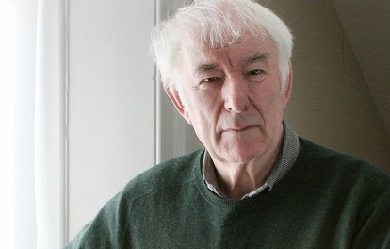
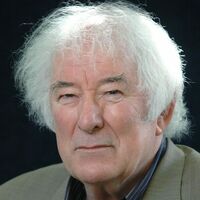
Seamus Justin Heaney (13 April 1939 – 30 August 2013) was an Irish poet, playwright and translator. He received the 1995 Nobel Prize in Literature. Among his best-known works is Death of a Naturalist (1966), his first major published volume. Heaney was and is still recognised as one of the principal contributors to poetry in Ireland during his lifetime. American poet Robert Lowell described him as “the most important Irish poet since Yeats”, and many others, including the academic John Sutherland, have said that he was “the greatest poet of our age”. Robert Pinsky has stated that “with his wonderful gift of eye and ear Heaney has the gift of the story-teller.” Upon his death in 2013, The Independent described him as “probably the best-known poet in the world”.


Born and raised in Soweto. God, my family and sports and music are the most important things in my life. I started writing poems as a hobby and then developed a greater liking for it. The poems I write are based on the emotions I feel at that time, but also sometimes they are inspired by music & movies. I write poetry to entertain and inspire other people to better themselves and that through them, they will learn & most importantly, know how strong and mighty God is.


Edward James (Ted) Hughes was born in Mytholmroyd, in the West Riding district of Yorkshire, on August 17, 1930. His childhood was quiet and dominately rural. When he was seven years old, his family moved to the small town of Mexborough in South Yorkshire, and the landscape of the moors of that area informed his poetry throughout his life. Hughes graduated from Cambridge in 1954. A few years later, in 1956, he co-founded the literary magazine St. Botolph’s Review with a handful of other editors. At the launch party for the magazine, he met Sylvia Plath. A few short months later, on June 16, 1956, they were married.

Rare & Strange...Lover of Wine, Sports, Skulls, The Sun, All Things Fast, Giving & Taking Chances, People Watching, Music, Poetry, Animals, Dialogue, Sensuality, Sexuality, Passion & Passionate People, Confidence, Art, Movies, Conversations, Romance, Philosophy & Johnny Depp.....Watching movies that make you think - like A waking life or with great dialogue. It's all about the lighting... What makes us different, you & I? I'm on my life mission of seeking the strange, yet the similar, the one who will make me think, make me not think, who will drive me wild with words, passion and love. I wear my heart on my sleeve and won't stop to let the world take away my spirit. I refuse to settle even if it means I never stop ...but I know he's out there my eclectic twin soul who will love adventure, random rants, giving and caring for others, fitting in between the cracks with me and standing out in the crowd too. Intelligent and Cultured , both city and country lover, who will pack up run through the mountains taking random photos of cemeteries and visions in the clouds, who will jump on a horse and ride a wild ride with me...a best friend, a soul mate, the other half who inspires me and I inspire he and long talks with large glasses of wine and endless nights in electric passion ...tantric, twisted, non-judging just accepting each other completely, swallowing each other ...









.jpg)
